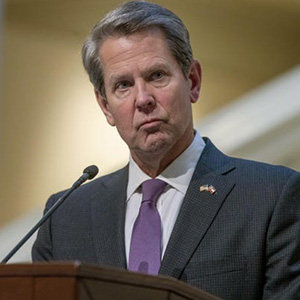Georgia’s New Election Law – SB 202 – Explained
The New Georgia Election Law – SB 202:
On March 25, 2021 Georgia Governor Brian Kemp signed Senate Bill 202 (SB 202) into state law. The 98-page bill introduced sweeping changes into state election laws. The bill was introduced and passed by Georgia’s Republican-led General Assembly, and was signed into law shortly after the conclusion of the 2020 general election which saw three key races in Georgia won by Democratic challengers over Republican incumbents, most notably:
• Presidential Election: Joseph R. Biden (D) defeated Donald J. Trump (R)
• Senate: Rev. Raphael Warnock (D) defeated incumbent Kelly Loeffler (R)
• Senate: John Ossoff (D) defeated incumbent David Purdue (R)
L.E.A.D., Inc.- SB 202 InfoGraphic:
At L.E.A.D., we believe that the sport of baseball is a metaphor for life. With that in mind, we created this baseball-themed infographic to help educate on the contents of SB 202, and to specifically highlight 16 key provisions of the 98-page bill that were detailed in an April 2, 2021 New York Times article.
Using the baseball analogy, the info-graphic depicts the 16 key provisions of the bill as stadium seating sections. Breaking the 98-page bill down to 16 key provisions is designed to simplify the content of the bill for readers, and to allow for the contents of the bill to be consumed in manageable chunks.
The 9 players on the field represent the 9 members of the Executive Branch of the Georgia State Government, from Governor down to Public Service Commission Chair. Bio’s of each of the 9 members of Georgia’s Executive branch are included in the infographic as well.
It should be noted that on June 25, 2021, the U.S Department of Justice headed by Attorney General Merrick B. Garland filed a lawsuit against the State of Georgia, the Georgia Secretary of State, and the Georgia State Election Board. The DOJ complaint contends that several provisions of SB 202 were adopted with the purpose of denying the right to vote on account of race.
The laws governing state elections influence who gets to “take the field” that is, who gets elected to state-level governmental positions as well as who gets to represent Georgians in Washington, D.C. We encourage you to interact with this infographic to educate yourself on the key provisions of SB 202 and to engage in healthy debate regarding the law.
Governor Brian Kemp (R)
 The 83rd Governor of Georgia, Brian P. Kemp took office in January 2019. Kemp's political career began when he served as a state senator from 2003-07. He served as Georgia Secretary of State from 2010-18.
The 83rd Governor of Georgia, Brian P. Kemp took office in January 2019. Kemp's political career began when he served as a state senator from 2003-07. He served as Georgia Secretary of State from 2010-18.
He is a business owner, entrepreneur, and investor.
Lieutenant Governor Geoff Duncan (R)
 Geoff Duncan took office in January 2019. Duncan served in the Georgia House of Representatives from 2013 until his election as Lieutenant Governor in the 2018 general election.
Geoff Duncan took office in January 2019. Duncan served in the Georgia House of Representatives from 2013 until his election as Lieutenant Governor in the 2018 general election.
He is a business owner and former minor league baseball pitcher.
Attorney General Chris Carr (R)
 Christopher M. Carr was sworn into office as Georgia's 54th Attorney General on November 1, 2016. He was elected to a new term in the 2018 general election. Carr believes there is no more solemn responsibility than to protect and defend the Constitution of the United States, the Constitution and laws of the State of Georgia and the interests of the people of the State of Georgia.
Christopher M. Carr was sworn into office as Georgia's 54th Attorney General on November 1, 2016. He was elected to a new term in the 2018 general election. Carr believes there is no more solemn responsibility than to protect and defend the Constitution of the United States, the Constitution and laws of the State of Georgia and the interests of the people of the State of Georgia.
Carr previously served as Commissioner of the Georgia Department of Economic Development under Governor Nathan Deal and as Chief of Staff for U.S. Senator Johnny Isakson.
Secretary Of State Brad Raffensperger (R)
 Brad Raffensperger took office in January 2019. Raffensperger served in the Georgia House of Representatives from 2015 until his election as Secretary of State in the 2018 general election.
Brad Raffensperger took office in January 2019. Raffensperger served in the Georgia House of Representatives from 2015 until his election as Secretary of State in the 2018 general election.
He is an engineer and business owner.
Insurance Commisioner Richard Woods (R)
 Richard Woods took office in January 2015 and was re-elected in the 2018 general election.
Richard Woods took office in January 2015 and was re-elected in the 2018 general election.
He works on behalf of the 1.7 million K-12 students in Georgia's public schools, championing child-focused, classroom-centered policies.
Insurance Commisioner Richard Woods (R)
 Richard Woods took office in January 2015 and was re-elected in the 2018 general election.
Richard Woods took office in January 2015 and was re-elected in the 2018 general election.
He works on behalf of the 1.7 million K-12 students in Georgia's public schools, championing child-focused, classroom-centered policies.
Public Service Commisioner Chuck Eaton (R)
 Commissioner Chuck Eaton took office in January 2007. He represents PSC District 3, the metro Atlanta area. To gain a better understanding of the judicial issues he faces at the commission, Commissioner Eaton began attending classes at Georgia State Law School in 2009 and studies nights as he works toward his degree.
Commissioner Chuck Eaton took office in January 2007. He represents PSC District 3, the metro Atlanta area. To gain a better understanding of the judicial issues he faces at the commission, Commissioner Eaton began attending classes at Georgia State Law School in 2009 and studies nights as he works toward his degree.
Labor Commissioner Mark Butler (R)
 A former legislator in the State House of Representatives, Commissioner Mark Butler took office in January 2011 and has been re-elected twice.
A former legislator in the State House of Representatives, Commissioner Mark Butler took office in January 2011 and has been re-elected twice.
Aiming for a full-hire economy, he focuses on helping job seekers apply for and receive unemployment benefits and forges partnership with private industry to connect those job seekers with employers.
Agriculture Commissioner Gary Black (R)
 After serving more than 2 decades as the president of the Georgia Agribusiness Council, Commissioner Gary W. Black accepted office in January 2011. He has been re-elected twice since.
After serving more than 2 decades as the president of the Georgia Agribusiness Council, Commissioner Gary W. Black accepted office in January 2011. He has been re-elected twice since.
He champions food safety, science-based environmental stewardship, and, through Georgia Grown, the local agriculture movement.



